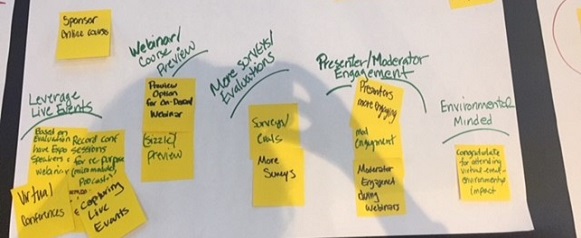
During my presentations at Learnapalooza’s conference, I had the pleasure of presenting a workshop to attendees on meeting the needs of multimodal learners. As a part of this content creator’s deep dive, the group participated in an Innovation Game titled, “Remember the Future.”
In this exercise I asked them to think ahead to five years in the future and ask themselves the question:
How will our learning program have changed to become more successful?
The participants were told to reflect on the ideas they had heard over the past few days at the conference and consider a variety of possible changes. I asked them to think about efficiencies, strategies, product offerings, system updates, member engagement, process refinements, and more.
Each person then took a few minutes to reflect individually and write down each of his or her changes on a sticky note. They then discussed their responses in a group, sharing best practices along the way, and arranged their sticky notes into categories, until they had nests of ideas on the board. The result is what you see above in the banner image.
The reflections were very insightful and illustrated the ambitious goals organizations have for the next five years. Many of our discussion points from the workshop and conference resonated and I saw particular trends emerge among the group. Here are some of our participant’s plans that you should also consider as you look to evolve your learning program into the future.
LMS Technology
A number of individuals said they’re looking to launch or upgrade a learning management system (LMS). They also noted the need to break down technology silos and implement integrations among their systems. We discussed how now is the time to audit the systems you’re using to deliver your learning and make sure they are scalable and flexible enough to support you into the future.
Virtual Learner Engagement
In the workshop we discussed one of the results from our Member Education and Career Development Report that hit home for attendees. In the report respondents indicated the top reason they rated the education they received “Fair” or “Poor” was because the content was not engaging. With this stat on the brain, a number of people said engagement would be a focus for them in the years to come. Ideas included building a member community, drawing in younger demographics, moderator and presenters incorporating more engagement into events, and using discussion forums and social learning.
Robust Offerings
As we’ve talked about, learners are after a variety of learning methods these days and want all the options at their disposal. Attendees embraced this concept during the brainstorm and are incorporating plans to beef up their education offerings. These plans include adding an on-demand academy, translating skill-based learning online, minimizing lecture-based programming, partnering with other entities to build up a suite of offerings, and organizing existing content better.
Nano Learning
Organizations are still trying to figure out how to incorporate nano learning into their education offerings, so it will be a big focus for many people in the coming years. We heard numerous attendees discuss their goals to launch micro-learning courses, as well, as more just-in-time opportunities for their members. We also discussed cross-selling nano programs into the longer-form versions and vice versa.
Repurposing Content
Leveraging the content you’re already producing is another goal of many workshop participants. This includes repurposing content, breaking up day-long courses into shorter archived sessions, capturing in-person events and selling the recordings, hosting virtual conferences, creating product bundles, promoting learning paths, and hosting rebroadcasts.
Data Management and LMS Integrations
A number of participants had visions of collecting more data and putting that data to better use. Many indicated they want to track more information in systems like an association management system (AMS) and increase their reliance on data. Others said they want to do a better job of surveying their membership, asking them what they need. There was also a desire to collect more feedback from events to measure what programming is the most popular. One attendee mentioned the desire to examine the evaluations from their conference and ask speakers with high scores to come back for a webinar.